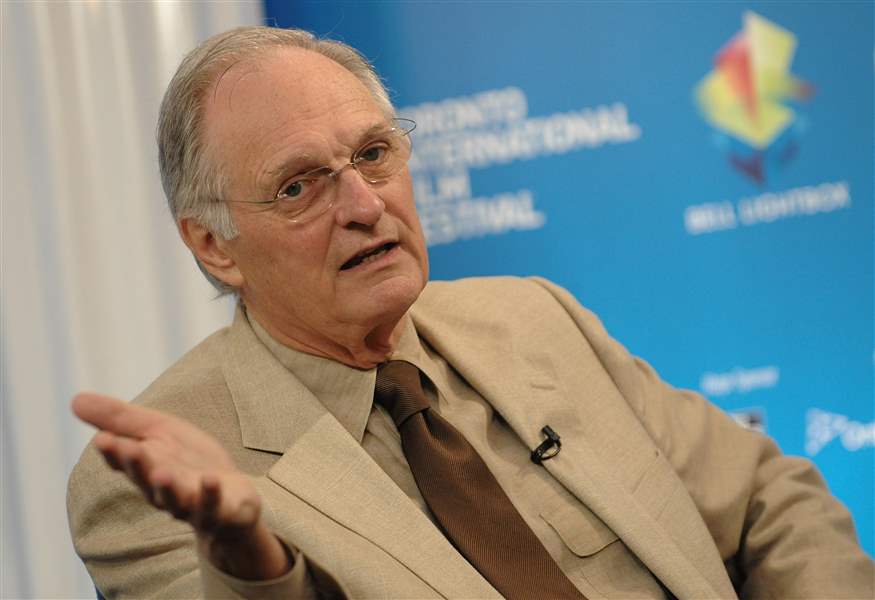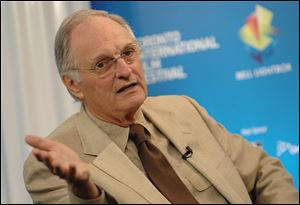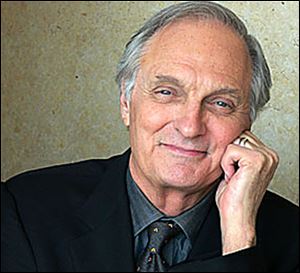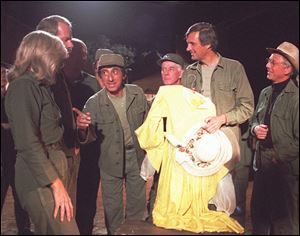
Getting the point across
Ahead of Thursday appearance in Toledo, Alan Alda discusses how acting helped him understand the art of communication
10/1/2017
Actor Alan Alda participates in a news conference for the film "Nothing But The Truth" during the Toronto International Film Festival in 2008.
ASSOCIATED PRESS
Acclaimed actor-writer-director known for making us laugh through the decades writes a book encouraging us to listen to each other.
What may sound like the set up to a familiar joke — of the man, bar, and strange request variety — is a snapshot of Alan Alda these days.
Mr. Alda, 81, who recently wrote If I Understood You, Would I Have This Look On My Face?, agreed.

Actor Alan Alda participates in a news conference for the film "Nothing But The Truth" during the Toronto International Film Festival in 2008.
"Yeah, that is true," he said at the outset of a recent interview to promote his 7 p.m. Thursday appearance at the Stranahan Theater, 4645 Heatherdowns Blvd., launching the new season of the Toledo Lucas County Public Library’s Authors! Authors! series. The event is sold out.
But there’s more to better communication than improved listening. That’s a major point of the book and the learning center that inspired it: the Alan Alda Center For Communicating Science at Stony Brook University in Long Island. For eight years, the center has worked with doctors and scientists and medical students to improve the way they communicate to patients and others outside their profession.
“It’s the additional idea that the person who has to do more listening to any of them is the person trying to communicate,” Mr. Alda said. “The whole idea is, how’s it landing on the person you’re trying to communicate with? And all the techniques that we have in dealing with that and improving that ability grow out of that central idea: The person you’re talking to is not the receiver of your information but your partner in communication, and you have to engage him as a partner."
Mr. Alda’s idea for the center developed in part through his longtime job as host of the PBS series Scientific American Frontiers, in which the actor would interview some of the world’s leading scientists and doctors — brilliant minds but not always smooth talkers. And that distance in communication can create barriers, often imperceptible to the expert who’s speaking.
“It’s obviously true that you have to listen to the doctor when the doctor talks to you,” Mr. Alda said. "But when the doctor is doing the talking, the doctor has the tremendous responsibility of listening when talking. Otherwise there’s no way of knowing if it’s scoring on the patient."
This kind of communication involves empathy, our ability to understand each other and share our feelings.
That kind of personal connection isn’t easy for everyone, particularly if it involves communication with strangers. But for actors, it’s a necessary component in their development and improvement, Mr. Alda said.

Alan Alda
"For me it’s the essence of acting, being able to respond to the other person so sensitively, so fully that they make you say what you have to say. You don’t say what you have to say because it’s in the script; you say it because the other person makes you say it, prompts you, fills you with the motivation to say and do what you do. I came to realize that kind of listening, where you’re vulnerable to what the other person is giving you, where you’re willing to be changed by the other person, that’s the kind of listening that leads to communication.
It comes from my earliest days in trying to be an actor, and it turns out to be useful in all kinds of communication in the office, in love, parenting, diplomacy, selling, all kinds of negotiating — every way that people have of talking to each other and trying to help the other person understand something difficult, something complicated, whether it’s quantum mechanics or how I feel when you talk to me that way. It can be a wide range of things that can be complicated to talk about it, but it all benefits from knowing what the other person is going through as you talk to them. That’s why it’s called If I Understood You Would I Have This Look on my Face? Are you looking at me? Are you paying attention to what you’re saying is landing on me?"
Mr. Alda was born in New York City to an actor father, Robert, and took up the craft at the age of 16 in summer stock in Barnesville, Pa.
While a junior at Fordham University, Mr. Alda studied in Europe, where he performed in theater in Rome and on television in Amsterdam with his father.
After graduating, he performed on and off-Broadway, trained with famed improvisational group Second City in New York, appeared as a regular on TV's That Was the Week That Was in the mid-1960s, and in 1966 received a Tony nomination for the musical The Apple Tree, which was directed by Mike Nichols.
His biggest break, of course, came as Capt. Benjamin “Hawkeye” Pierce, the sardonic war-time surgeon Mr. Alda played for 11 years on the classic CBS sitcom M*A*S*H. Alda also wrote and directed several of the show’s episodes including its finale, Goodbye, Farewell, and Amen, which remains the most-watched non-sports program in TV history.
And while for many of us the end of Hawkeye and M*A*S*H was like losing a friend, Mr. Alda moved on from both long ago.

Members of the "M*A*S*H" cast gather around to bury Klinger's yellow dress in a foot-locker time capsule during taping of the show's final episode in January 1983. From left, are cast members Loretta Swit, Mike Farrell, Jamie Farr, Harry Morgan, Alan Alda and William Christopher.
“I internalize a character while playing it, but then I just leave it behind,” he said. “I don’t look back much on things that I’ve moved on from. I did keep my boots, the boots and the dog tags as a memento because I wore the same boots and the same dog tags every day for 11 years. The dog tags came from real people, I guess, who had served during World War II. They were kind of sentimental mementoes to me. But ... I forget where I put the boots. I kept them but I don’t have a shrine to them.”
After M*A*S*H, though, Mr. Alda’s career never slowed. The acclaimed actor has been in numerous films, TV series, and theatrical productions and worked with Woody Allen (Crimes and Misdemeanors, Manhattan Murder Mystery), Martin Scorsese (The Aviator; Mr. Alda was nominated for a Best Supporting Actor Oscar for his performance as Howard Hughes’ antagonist Sen. Ralph Owen Brewster), and Steven Spielberg (Bridge of Spies).
He’s received six Emmys and has been nominated 34 times and has been nominated for three Tonys, most recently for the 2005 revival of David Mamet’s Glengarry Glen Ross. He’s also the author of several best-selling books.
And, yes, there was that time in the early 1980s that he was the commercial spokesman for the Atari 8-bit computers, which showcased his charming wit, tech knowledge, and collection of comfortable sweaters.
Mr. Alda laughs about promoting the computing power of what is now comically obsolete.
“Atari computer was such a basic computing thing, we probably have more computing power in our watches now than the old computers then,” Mr. Alda said. “But I was fascinated with it. I learned a little bit of computing language called BASIC, and I programmed the Atari to mimic a therapy session, where it asked you to tell it about yourself. And it would pick up on certain words you were saying [and then respond]: ‘Oh, tell me about your mother? Do you like your job?’ And by the time it drew you in and you were really talking to it, it would say, ‘I’m sorry, your time is up.’ Just like a real session.”
As for a reunion with former M*A*S*H costar, Toledo’s own Jamie Farr, who will be in town Friday for his one-man show at the Stranahan, Mr. Alda said schedules didn't allow an onstage reunion, though the cast does get together once a year.
“We sit around a table, just like the old days, and we make fun of each other,” he said.
Is there anything about Farr he’d like to share?
“I can’t remember one except that I can tell you that the high heels really did hurt his feet,” Alda said. “But he was a good soldier, and he wore his high heels with pride.”
Contact Kirk Baird at kbaird@theblade.com or 419-724-6734.